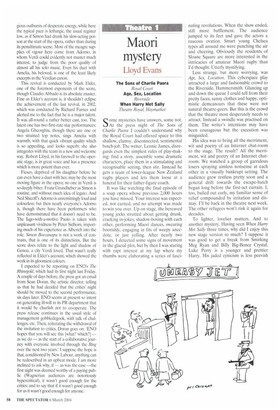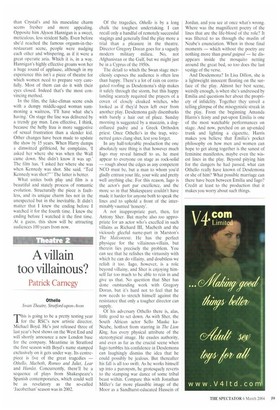Maori mystery
Lloyd Evans
The Sons of Charlie Paora Royal Court Age, Sex, Location Riverside When Harry Met Sally Theatre Royal, Haymarket ome mysteries have answers, some not.
At the press night of The Sons of Charlie Paora I couldn't understand why the Royal Court had offered space to this shallow, clumsy, disconnected, sentimental botch-job. The writer, Lennie James, disregards even the simplest rules of play-making: find a story, assemble some dramatic characters, place them in a stimulating and recognisable setting, then stir. Instead he gets a team of lower-league New Zealand rugby players and lets them loose at a funeral for their father-figure coach.
It was like watching the final episode of a soap opera whose previous 2,000 hours you have missed. Your interest was expected, not earned, and no attempt was made to win you over. Up on stage, the bereaved young jocks strutted about getting drunk, cracking in-jokes, shadow-boxing with each other, performing Maori dances, swearing boorishly, engaging in fits of weepy anecdote, or just yelling. After nearly two hours, I detected some signs of movement in the glacial plot, but by then I was staring with rapt interest at my lap where my thumbs were elaborating a series of fasci
nating revolutions. When the show ended, still more bafflement. The audience jumped to its feet and gave the actors a raucous ovation. Smart young Chelsea types all around me were punching the air and cheering. Obviously the residents of Sloane Square are more interested in the intricacies of amateur Maori rugby than I'd thought. Utterly mystifying.
Less strange, but more worrying, was Age, Sex, Location. This cyberspace play attracted a large and fashionable crowd to the Riverside, Hammersmith. Glancing up and down the queue I could tell from their pretty faces, sunny clothes and happy, optimistic demeanours that these were not natural theatre-goers. But this is the crowd that the theatre most desperately needs to attract. Instead a swindle was practised on them. The writer's intentions may have been courageous but the execution was misguided.
His idea was to bring all the merriment, wit and poetry of an Internet chat-room to the stage. The result? All the merriment, wit and poetry of an Internet chatroom. We watched a group of garrulous losers spraying aimless nonsense at each other in a visually bankrupt setting. The audience grew restless pretty soon and a general drift towards the escape-hatch began long before the first-act curtain. I, too, bailed out early, my familiar sense of relief compounded by irritation and dismay. I'll be back in the theatre next week. The other refugees won't risk it again for decades.
To lighter, lovelier matters. And to another mystery. Having seen When Harty Met Sally three times, why did I enjoy this new stage version so much? I suppose it was good to get a break from Smirking Meg Ryan and Billy Big-Bonce Crystal. Luke Perry is a younger and prettier Harry. His jaded cynicism is less peevish than Crystal's and his masculine charm seems fresher and more appealing. Opposite him Alyson Hannigan is a sweet, meticulous, less strident Sally. Even before she'd reached the famous orgasm-in-therestaurant scene, people were nudging each other and whispering, as if it were a great operatic aria, Which it is, in a way. Hannigan's highly effective groans won her a huge round of applause, although in my experience this isn't a piece of theatre for which women need to prepare very carefully. Most of them can do it with their eyes closed. Indeed that's the most convincing method.
In the film, the fake-climax scene ends with a dumpy middle-aged woman summoning a waitress, 'I'll have what she's having.' On stage the line was delivered by a trendy gay man. Less effective, I think, because the hefty frau is more suggestive of sexual frustration than a slender kid. Other changes have been made to update the show by 15 years. When Harry dumps a dimwitted girlfriend, he complains, 'I asked her where she was when the Wall came down. She didn't know it was up.' The film has, 'I asked her where she was when Kennedy was shot. She said, "Ted Kennedy was shot?"' The latter is better.
What unites both play and film is a beautiful and stately process of romantic evolution. Structurally the piece is faultless, and its unique charm lies not in the unexpected but in the inevitable. It didn't matter that I knew the ending before I watched it for the fourth time. I knew the ending before I watched it the first time. At a guess, this show will be attracting audiences 100 years from now.



















































































 Previous page
Previous page